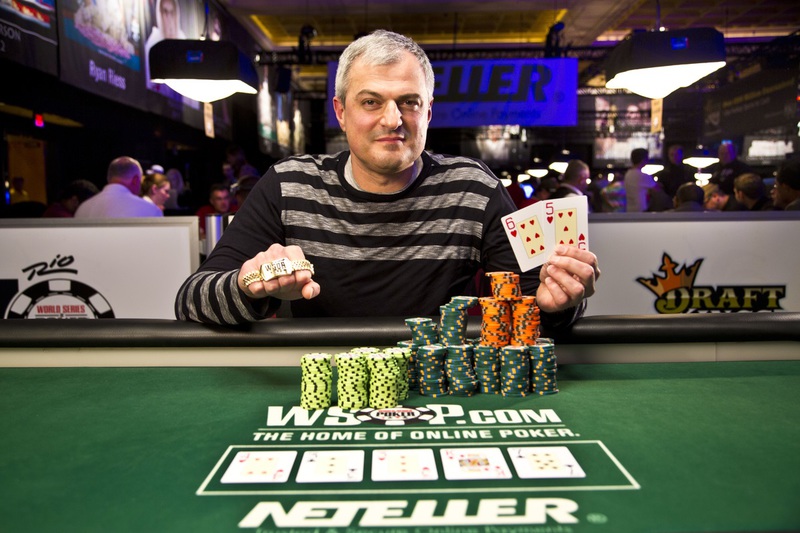






Poker Hand of the Week: 7/10/14You Decide What's The Best Play |
|
|
Give us your opinion in the comments section below for your chance at winning a six-month Card Player magazine digital subscription.
Ask any group of poker players how you played your hand and they’ll come up with dozens of different opinions. That’s just the nature of the game.
Each week, Card Player will select a hand from the high-stakes, big buy-in poker world, break it down and show that there’s more than one way to get the job done.

The Scenario
You are currently three handed for a major tournament title. The remaining payouts are $283,895 for third, $394,281 for second and $637,539 for the winner. You are the shortest stack left, but with the blinds at 100,000-200,000 with a 30,000 ante and a chip count of 4,315,000, you still have just over 21 big blinds to work with.
The chip leader with 7,900,000 folds the button and you limp in the small blind with A 7
7 . The big blind, a player who has you slightly covered with 5,8785,000, checks his option.
. The big blind, a player who has you slightly covered with 5,8785,000, checks his option.
The flop comes down Q J
J 3
3 , giving you the nut flush draw and an over card. You bet 200,000 and your opponent calls. The turn is the 9
, giving you the nut flush draw and an over card. You bet 200,000 and your opponent calls. The turn is the 9 and you check. Your opponent bets 550,000. You have 3,885,000 behind.
and you check. Your opponent bets 550,000. You have 3,885,000 behind.
The Questions
Do you call, raise or fold? If calling, what is your plan if you brick the river? What is your plan if you hit your flush? If raising, how much? Does an all-in bet make sense in this spot? If folding, why? What kind of hand is your opponent representing with his line?

Igor Dubinskyy
Facing a bet of 550,000 on a board of Q J
J 3
3 9
9 at the WSOP Little One For One Drop final table, Brandon Eisen opted to move all in for his last 3,885,000.
at the WSOP Little One For One Drop final table, Brandon Eisen opted to move all in for his last 3,885,000.
His opponent, Theodore Driscoll, tanked for almost two minutes before calling with K 2
2 , much to Eisen’s surprise. Eisen had to fade a king or non-diamond ten or deuce to double up to the chip lead, but the river was the 2
, much to Eisen’s surprise. Eisen had to fade a king or non-diamond ten or deuce to double up to the chip lead, but the river was the 2 , giving Driscoll the knock out.
, giving Driscoll the knock out.
Eisen’s third place finish was worth $283,895. Driscoll was eventually eliminated in second place, earning $394,281. The eventual winner was Igor Dubinskyy, who pocketed $637,539 and his first gold WSOP bracelet.
What would you have done and why? Let us know in the comments section below and try not to be results oriented. The best answer will receive a six-month Card Player magazine digital subscription.
